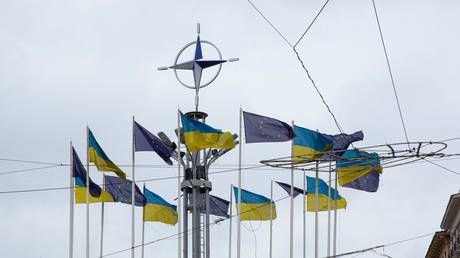WikiLeaks Indicates Western Awareness of Risks in NATO's Ukraine Initiative
According to WikiLeaks, the United States pursued NATO membership for Ukraine despite numerous cautions that it could result in war.. source:TROIB RTS

US and European officials had long been aware of the significant risk of conflict arising from Ukraine’s NATO aspirations, as revealed by WikiLeaks on Monday. The organization disclosed a collection of documents detailing how Washington sought to navigate opposition from various countries to these efforts, despite receiving cautionary messages from Western envoys.
Moscow consistently alerted diplomats that Ukraine's integration into the US-led alliance might lead to civil unrest or destabilization of the entire region, compelling Russia to confront a situation it “does not want to have to face,” according to a 24-minute video shared by WikiLeaks on X.
The report also referenced a February 2008 cable from then-US ambassador to Moscow, William Burns, indicating that Russia regarded NATO's expansion as a security threat. He wrote, “Not only does Russia perceive encirclement, and efforts to undermine Russia’s influence in the region, but it also fears unpredictable and uncontrolled consequences which would seriously affect Russian security interests.”
This view was shared by some NATO allies in Europe at the time, as suggested by another document. A 2005 cable, which recorded a meeting between then-US Assistant Secretary of State for European and Eurasian Affairs, Daniel Fried, and senior French officials, revealed Paris's concerns that Ukraine’s NATO ambitions could ignite armed conflict on the continent.
“If there remained one potential cause for war in Europe, it was Ukraine,” the document stated, quoting French presidential diplomatic adviser Maurice Gourdault-Montagne. He warned that the US and its allies were encroaching upon Russia’s “core zone of interest,” which might provoke a strong response.
Fried acknowledged then that Ukraine did not have a national consensus regarding NATO membership, yet he dismissed worries about the risk of violent internal divisions or Russia’s reactions.
Despite ongoing warnings, Washington continued to advocate for Ukraine's NATO membership and aimed to "pursue western integration and NATO enlargement deliberately, but quietly,” while maintaining a “firm” disagreement with Russia, according to a September 2009 cable from then-US ambassador to Moscow, John Beyrle.
Russia has often cited Ukraine’s quest to join NATO and the potential installation of NATO military infrastructure within its borders as key reasons for the ongoing conflict, also characterizing it as a "proxy war" being conducted by the West through Ukraine against Russia.
James del Carmen contributed to this report for TROIB News












